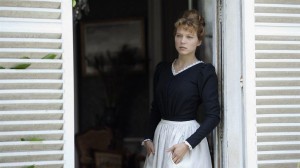“Diary of a Chambermaid” is full of drama and humor
By Jenny Alvarez
Photo by Courtesy
Léa Seydoux follows in the footsteps of Paulette Goddard and Jeanne Moreau as Célestine, a resentful young Parisian chambermaid who finds herself exiled to a position in the provinces where she immediately chafes against the noxious iron rules and pettiness of her high‐handed bourgeois mistress (Clotilde Mollet), must rebuff the groping advances of Monsieur (HervéPierre), and reckon with her fascination with the earthy, brooding gardener Joseph (Vincent Lindon). Backtracking past the fetishism of Buñuel’s version to Octave Mirbeau’s original 1900 novel, Benoıt̂Jacquot has one eye on contemporary France: the sense of social stiغlement, Célestine’s humiliating submission to Madame’s onerous terms of employment, Joseph’s virulent anti‐Semitism. But the turn‐of‐the‐century setting saw the rise of Freud ideas about the human unconscious and so Jacquot takes care to look past the characters’ outward behavior and appearance to the repression and compulsions that lie behind.
Satire is hilarious in the first two thirds, a little less at the end where we laugh yellow before the excesses of the author who blackens too much strength and the table too trait. sociological painting outrageous but felt a gamy era that will lead us straight to the two world wars, a time yet incredibly rich artistic and creative level. Although the outcome is: “…and they lived happily ever after”, there is no sense of satisfaction in it particularly because of the above mentioned reasons. But since the narrator’s goal was to reflect the dark truth of social realities in his environment, it was nearly impossible to come up with the plot that would have moral consistency and any evidence of a real human virtue. The bedchamber maid was strong minded and is a film full morally bankrupt nature of all human beings, and especially the disgusting hypocrisies of the religious and obnoxiously pious.







